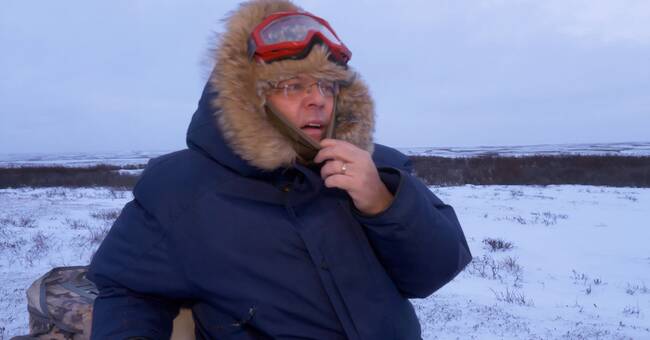In December, it used to be at least ten degrees cold in the reindeer herding area in the Russian Arctic.
This year it is much warmer.
Nice, but it also means that the ice has barely settled on the river and that the snow cover is only centimeters thick.
I do not realize what that means until our journey to the land of the Nents begins.
It is about 60 km along the Petjora River from the region's big city Narjan-Mar (twenty-five thousand inhabitants) to the Nents' small village Nelmin-Nos.
Normally you snowmobile there, but now the ice does not hold, so it becomes a kind of hovercraft instead.
After a little over an hour in pitch darkness with the heart in the pit of the throat over biting ice and open water, we arrive and change to snowmobiles.
- Hold on tight now, says my driver.
- Of course, I say, without understanding what awaits.
It is almost bare ground and the snowmobile bounces up and down, sways back and forth and often risks overturning.
At the seat in my seat behind the driver are a couple of handles.
I hold on so the knuckles whiten.
Twice we fall over.
Finally we arrive at the place where the nents gather their reindeer.
Inside their "tjum", a kind of large tent erected on rough tree branches, it is warm.
The reindeer traps are soft and comfortable.
Our reindeer herder's acquaintance cuts coarse slices of raw reindeer meat, which he dips in fresh reindeer blood and lets himself taste well.
My photographer, Anton Koposov, also eats.
I'm skipping the blood.
In the evening we sit near the stove and sweat.
Now fried reindeer meat.
Better, I think.
But how will it go for the nents?
There are not many thousands left.
All women and most men have abandoned nomadic life and now live in the small village.
There is a school, electricity and mobile networks.
But neither running water nor sewage.
The most talkative of the nents is Gregory Aliyev.
Like the others in the "tjuman", he usually does not speak his own language (Nentian) but Russian, also with his comrades.
- What do you think about the future of your people.
Are you still there in fifty years?
- Our way of life and our culture will be gone in ten years, he answers.
I'm getting sad.
A culture, a language and a way of life go to the grave.
On the other hand: many of the children born today in the land of the nents probably also want to live much like me.

